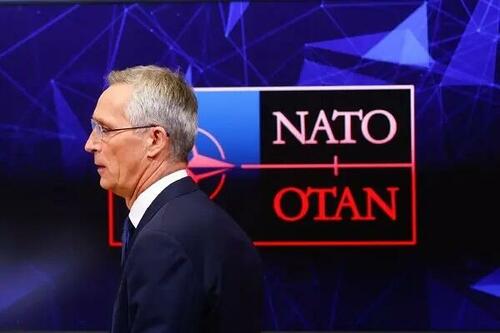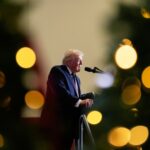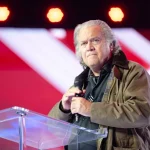
Outgoing NATO chief Jens Stoltenberg has addressed the question of the US and UK mulling allowing Ukraine to strike Russian territory with West-supplied long-range weapons. President Putin last week spelled out clearly that if this happened then Moscow and NATO would be in a state of direct war.
Stoltenberg downplayed this threat of major new escalation in a Monday interview with LBC radio, saying he "welcomed" the discussion over long-rage missiles. He separately told Foreign Policy he's in favor of the West greenlighting long-range strikes on Russian soil.

"I welcome these developments and these decisions but its for individual allies to make the final decisions," Stoltenberg said. "Allies have different policies on this."
And yet strangely, he seemed to admit the potential for nuclear-armed confrontation. "So far, we haven't seen any changes in their nuclear posture that require any changes from our side," he said, while acknowledging that there won't be any winners in a nuclear war.
He was pressed over the question of Russia's reaction if the West goes ahead with this long-range escalation:
Asked about possible Russian retaliation, Stoltenberg said there were "no risk-free options in the war".
"But I continue to believe that the biggest risk for us, for United Kingdom, for NATO, will be if President Putin wins in Ukraine," he added.
At this moment, the Russian side is indeed 'winning' in terms of Putin's stated objectives to fully control the Donbass in Ukraine's east. Zelensky has been seeking to escalate against Russian territory out of desperation, and in hopes Moscow would be forced to pull manpower from Donetsk and redirect it to Kursk.
Stoltenberg has rejected Putin's assertion that NATO will be a direct part of the war if long-range attacks on Russia are approved. He in a separate Foreign Policy interview stated "This is not correct when President Putin says that we will become party to the conflict."
He attempted to explain that given NATO doesn't consider Iran and North Korea direct parties to the conflict over their alleged military aid shipments to Moscow, neither should Russia see NATO in the same light.
Of course, what Stoltenberg is leaving out is the heart of the issue: that this would involve Western weapons directly striking Russian territory, perhaps even as far as Moscow oblast. None of this will convince Putin that somehow NATO is not a party to the conflict.
Stoltenberg emphasized Ukraine's right to self-defense, which includes the "right to strike targets inside the territory of the aggressor [Russia]." The NATO chief laid out that he is "in favor of loosening restrictions" of Ukraine using long-range Western weapons to attack Russia.
NATO Secretary-General @jensstoltenberg says on FP Live that he is in favor of allies loosening restrictions on Ukraine’s use of Western-made long-range missiles. Watch the full interview or read the Q&A here: https://t.co/3WEPN7WMqA pic.twitter.com/Lm4xle93pG
— Foreign Policy (@ForeignPolicy) September 16, 2024
To recount, Putin anticipated these arguments. He explained last Friday, "So this is not about whether or not to allow the Ukrainian regime to strike Russia using these weapons, but of deciding whether or not NATO countries are directly involved in the military conflict or not. If such a decision is taken, it will mean nothing short of direct participation of NATO countries, the United States, European countries, in the war in Ukraine."
The Russian leader had continued in his televised short remarks: "This would constitute their direct participation, and this, of course, changes the very essence, the very nature of the conflict. It will mean that NATO countries, the United States and European countries, are at war with Russia." He couldn't have been any clearer.
Outgoing NATO chief Jens Stoltenberg has addressed the question of the US and UK mulling allowing Ukraine to strike Russian territory with West-supplied long-range weapons. President Putin last week spelled out clearly that if this happened then Moscow and NATO would be in a state of direct war.
Stoltenberg downplayed this threat of major new escalation in a Monday interview with LBC radio, saying he “welcomed” the discussion over long-rage missiles. He separately told Foreign Policy he’s in favor of the West greenlighting long-range strikes on Russian soil.

“I welcome these developments and these decisions but its for individual allies to make the final decisions,” Stoltenberg said. “Allies have different policies on this.”
And yet strangely, he seemed to admit the potential for nuclear-armed confrontation. “So far, we haven’t seen any changes in their nuclear posture that require any changes from our side,” he said, while acknowledging that there won’t be any winners in a nuclear war.
He was pressed over the question of Russia’s reaction if the West goes ahead with this long-range escalation:
Asked about possible Russian retaliation, Stoltenberg said there were “no risk-free options in the war”.
“But I continue to believe that the biggest risk for us, for United Kingdom, for NATO, will be if President Putin wins in Ukraine,” he added.
At this moment, the Russian side is indeed ‘winning’ in terms of Putin’s stated objectives to fully control the Donbass in Ukraine’s east. Zelensky has been seeking to escalate against Russian territory out of desperation, and in hopes Moscow would be forced to pull manpower from Donetsk and redirect it to Kursk.
Stoltenberg has rejected Putin’s assertion that NATO will be a direct part of the war if long-range attacks on Russia are approved. He in a separate Foreign Policy interview stated “This is not correct when President Putin says that we will become party to the conflict.”
He attempted to explain that given NATO doesn’t consider Iran and North Korea direct parties to the conflict over their alleged military aid shipments to Moscow, neither should Russia see NATO in the same light.
Of course, what Stoltenberg is leaving out is the heart of the issue: that this would involve Western weapons directly striking Russian territory, perhaps even as far as Moscow oblast. None of this will convince Putin that somehow NATO is not a party to the conflict.
Stoltenberg emphasized Ukraine’s right to self-defense, which includes the “right to strike targets inside the territory of the aggressor [Russia].” The NATO chief laid out that he is “in favor of loosening restrictions” of Ukraine using long-range Western weapons to attack Russia.
NATO Secretary-General @jensstoltenberg says on FP Live that he is in favor of allies loosening restrictions on Ukraine’s use of Western-made long-range missiles. Watch the full interview or read the Q&A here: https://t.co/3WEPN7WMqA pic.twitter.com/Lm4xle93pG
— Foreign Policy (@ForeignPolicy) September 16, 2024
To recount, Putin anticipated these arguments. He explained last Friday, “So this is not about whether or not to allow the Ukrainian regime to strike Russia using these weapons, but of deciding whether or not NATO countries are directly involved in the military conflict or not. If such a decision is taken, it will mean nothing short of direct participation of NATO countries, the United States, European countries, in the war in Ukraine.”
The Russian leader had continued in his televised short remarks: “This would constitute their direct participation, and this, of course, changes the very essence, the very nature of the conflict. It will mean that NATO countries, the United States and European countries, are at war with Russia.” He couldn’t have been any clearer.
Loading…





